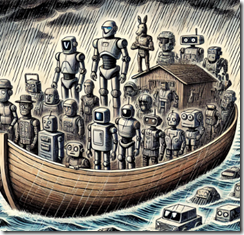AI Doom: Really Smart Software Is Coming So Start Being Afraid, People
January 20, 2025
 Prepared by a still-alive dinobaby.
Prepared by a still-alive dinobaby.
The essay “Prophecies of the Flood” gathers several comments about software that thinks and decides without any humans fiddling around. The “flood” metaphor evokes the streams of money about which money people fantasize. The word “flood” evokes the Hebrew Biblical idea’s presentation of a divinely initiated cataclysm intended to cleanse the Earth of widespread wickedness. Plus, one cannot overlook the image of small towns in North Carolina inundated in mud and debris from a very bad storm.
When the AI flood strikes as a form of divine retribution, will the modern arc be filled with humans? Nope. The survivors will be those smart agents infused with even smarter software. Tough luck, humanoids. Thanks, OpenAI, I knew you could deliver art that is good enough.
To sum up: A flood is bad news, people.
The essay states:
the researchers and engineers inside AI labs appear genuinely convinced they’re witnessing the emergence of something unprecedented. Their certainty alone wouldn’t matter – except that increasingly public benchmarks and demonstrations are beginning to hint at why they might believe we’re approaching a fundamental shift in AI capabilities. The water, as it were, seems to be rising faster than expected.
The signs of darkness, according to the essay, include:
- Rising water in the generally predictable technology stream in the park populated with ducks
- Agents that “do” something for the human user or another smart software system. To humans with MBAs, art history degrees, and programming skills honed at a boot camp, the smart software is magical. Merlin wears a gray T shirt, sneakers, and faded denims
- Nifty art output in the form of images and — gasp! — videos.
The essay concludes:
The flood of intelligence that may be coming isn’t inherently good or bad – but how we prepare for it, how we adapt to it, and most importantly, how we choose to use it, will determine whether it becomes a force for progress or disruption. The time to start having these conversations isn’t after the water starts rising – it’s now.
Let’s assume that I buy this analysis and agree with the notion “prepare now.” How realistic is it that the United Nations, a couple of super powers, or a motivated individual can have an impact? Gentle reader, doom sells. Examples include The Big Short: Inside the Doomsday Machine, The Shifts and Shocks: What We’ve Learned – and Have Still to Learn – from the Financial Crisis, and Too Big to Fail: How Wall Street and Washington Fought to Save the Financial System from Crisis – and Themselves, and others, many others.
Have these dissections of problems had a material effect on regulators, elected officials, or the people in the bank down the street from your residence? Answer: Nope.
Several observations:
- Technology doom works because innovations have positive and negative impacts. To make technology exciting, no one is exactly sure what the knock on effects will be. Therefore, doom is coming along with the good parts
- Taking a contrary point of view creates opportunities to engage with those who want to hear something different. Insecurity is a powerful sales tool.
- Sending messages about future impacts pulls clicks. Clicks are important.
Net net: The AI revolution is a trope. Never mind that after decades of researchers’ work, a revolution has arrived. Lionel Messi allegedly said, “It took me 17 years to become an overnight success.” (Mr. Messi is a highly regarded professional soccer player.)
Will the ill-defined technology kill humans? Answer: Who knows. Will humans using ill-defined technology like smart software kill humans? Answer: Absolutely. Can “anyone” or “anything” take an action to prevent AI technology from rippling through society. Answer: Nope.
Stephen E Arnold, January 20, 2025



